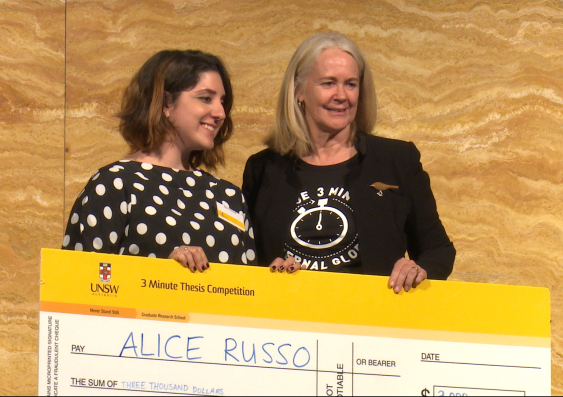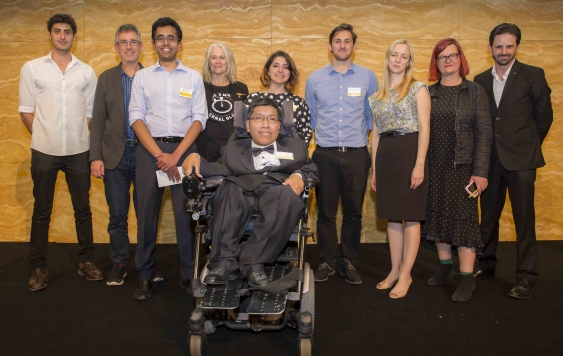Years of research condensed into three minutes
UNSW PhD candidate Alice Russo has won the 3-Minute Thesis competition based on her research into ancient viruses.
UNSW PhD candidate Alice Russo has won the 3-Minute Thesis competition based on her research into ancient viruses.

Endogenous viral elements, or EVEs for short, that are present in host genomes are a "fossil record" of past infections and reveal new information about what viruses once infected the animal.
UNSW PhD candidate Alice Russo reckons these ancient viruses could even help us find a contemporary cane toad virus that could be used to control the population of the amphibian pest.
That was the bite-sized pitch Russo made about her research to a panel judging the final of UNSW Sydney’s 3-Minute Thesis (3MT) competition.
Twenty-two PhD candidates from across UNSW had just three minutes to give a compelling oration on their thesis topic that would engage an intelligent but non-specialist audience.
The candidates’ research explored new frontiers in medicine, business, science, law, engineering, the built environment and the social sciences with fresh insights into combatting climate change, drug control in sport, disability-inclusive development planning and autonomous systems planning.
Russo, from the School of Biotechnology and Biomolecular Sciences, won a $3000 cash prize and will now represent UNSW at the Asia Pacific Competition at the University of Queensland, and at the international Universitas 21 final – a virtual event with judges watching video presentations.
“Our research group, headed by Professor Peter White, is delighted that this will increase people’s awareness of the cane toad problem and how we can solve it with a molecular approach," says Russo.
"The 3MT is a challenging experience which pushes you to think outside the box,” she says.
How do you condense years of research down to just three minutes? That’s the challenge for 23 competitors in the Three Minute Thesis (3MT).
3MT runner-up Mayooran Namasivayam, from the Victor Chang Institute, won $1,500 with his pitch about his team’s pioneering technique to replace the mitral valve in people without stopping the heart.
Third Prize and People's Choice Winner Antoni Tsaputra, from Arts and Social Sciences, received $1,000 for his succinct summary of his thesis about enabling people with disabilities to have a say in Indonesia’s development planning.
The ASPIRE winner was decided by year 10 and 11 students from Chester Hill High School, Punchbowl Boys High School and Granville South Creative and Performing Arts (CAPA) High School. They chose Jonathan Horlyck, from the Faculty of Engineering, who was awarded $500 for his explanation of how the problem of global warming could be solved with nanoparticle technology.
Trying to compress your doctoral research into a three-minute pitch is more difficult, in many ways, than writing the thesis itself, says Professor Laura Poole-Warren, Pro Vice-Chancellor (Research Training) and Dean of Graduate Research.
“I really love this event as it engages our postgraduate researchers to take up the challenge of learning to communicate simply and clearly without dumbing down the research,” she says.

Trying to compress your doctoral research into a three-minute pitch is more difficult, in many ways, than writing the thesis itself.